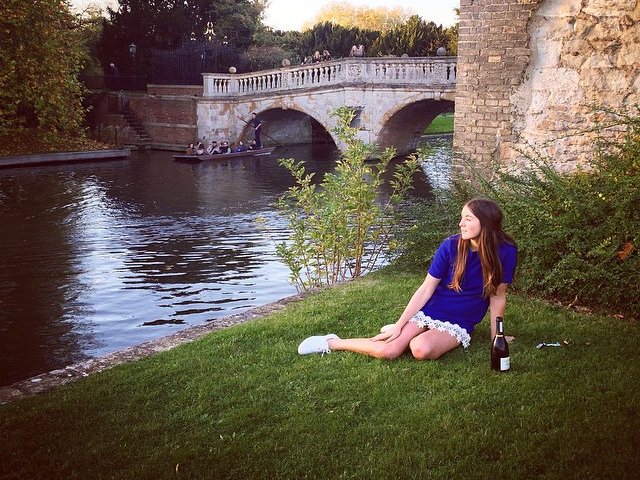Pop Art, A Job as creative, offers you Freedom from Blindness and Drudgery, but tends to free you from benefits and security instead
流行藝術,盡管是一門創造性的工作,能讓您避免盲目和乏味,但也有讓您脫離福利和安全的傾向
By Jody Rosen
文/喬迪·羅森
For a few days, a couple of weeks ago,
幾周前,有好幾天,
a small but influential corner of the media world was transfixed by the story of Caroline Calloway and her Creativity Workshop.
媒體圈規模雖小但頗具影響力的一個角落被卡羅琳·卡洛威和她的“創意工廠”的故事震驚了。
Calloway is a 27-year-old with a large Instagram following,
卡洛威是一名27歲的Ins網紅,
built by chronicling her time as an undergraduate at the University of Cambridge (picture lolling on the banks of the River Cam)
她走紅靠的是在Ins上記錄她在劍橋大學的本科生活(懶洋洋地躺在劍河岸邊的照片)
and her daily life as a gal-about-town in New York City.
以及她在紐約推薦達人的日常生活。----
Early in January, she announced to her 830,000 followers
1月初,她向她的83萬粉絲宣布,
that she would be holding a series of four-hour, $165 seminars in several American cities,
她將在美國的多個城市舉辦一系列時長四小時,門票165美元的研討會,
a chance for fans to meet Calloway and imbibe some of her wisdom on “true creative fulfillment.”
屆時,粉絲們將有機會見到她本人,并向她取經,學習如何“做成真正有創意的事”。
What followed was a fiasco:
接下來發生的事卻異常尷尬:
Early seminars failed to deliver promised amenities,
不僅最初的幾場研討會未能兌現卡洛威之前許諾給粉絲們的那些好處,
and Calloway turned out to have sold tickets to some events without having located venues for them.
而且,有幾場活動的門票都已經賣出去了,場地卻都還沒定下來。

A muckraking Twitter thread materialized, scorning Calloway as a “scammer”;
一個專門爆料的推特帖子出現了,奚落卡洛威是個“騙子”;
she promptly canceled and then uncanceled the tour,
她便立即取消了該行程,之后卻又恢復了行程,
all while zapping out flurries of alternately self-flagellating and self-justifying posts on Instagram Stories.
與此同時,她還在Ins上狂發時而自我鞭撻、時而自我辯護的帖子。
As scandals go, this was minor stuff — more opéra bouffe than outrage.
正如那些丑聞中說的那樣,這還不算什么——與其說是場憤怒,倒不如說是場輕歌劇。
(“This Instagram Influencer’s Failed Tour Will Satisfy Your Fyre Fest Nostalgia,” cracked a headline on New York magazine’s Intelligencer site.)
(“這位Ins紅人‘未能成功的巡回訪問’將滿足你對Fyre Fest音樂節的懷念,”《紐約》雜志Intelligencer網站的一則頭條寫道。)
But to many commentators, the episode was a revealing parable of the internet age:
但對許多評論員來說,這一事件堪稱互聯網時代一個發人深省的寓言故事:
a glimpse of the chaos that lurks behind the immaculately curated feeds of our self-styled lifestyle gurus
它讓我們得以窺見我們那些自詡生活達人們精心策劃的推送背后隱藏的混亂,
and the hollowness of their advice on, as Calloway put it in the event listing for her seminars,
以及他們,正如卡洛威在她的研討會的活動清單中所寫的那樣,
how to “stay connected to your creative self” and “carve out and stick to a creative schedule.”
在如何“與充滿創造力的那個自我始終保持聯系”,“制定并堅持執行一個充滿創造力的時間表”這些問題上給出的建議的空洞本質。
Give Calloway credit for this: In branding herself an oracle of all things creative, she has her finger firmly on the pulse.
通過把自己塑造成一位預言所有創造性事物的先知,她可以說是緊跟著時事動態的。這一點要歸功于她自己。
In 2019, “creative” is a juggernaut, a ubiquitous word that touches on all kinds of contemporary aspirations and anxieties.
而2019年,“創意”將成為一股強大的力量,一個無處不在,觸及當代各種抱負和焦慮的詞。
Businesses employ creative directors to tackle problems with creative solutions.
企業聘請能創造性地解決問題的創意總監。
Politicians intone “creative” with the solemnity they once reserved for such terms as “freedom” and “family.”
政客們用他們曾經專為“自由”和“家庭”等詞保留的莊嚴歌頌“創造性”。
It is a bipartisan bromide: In his November 2016 victory speech, Donald Trump promised to “harness the creative talents of our people.”
這是兩黨都存在的陳詞濫調:2016年11月勝選演講中,唐納德·特朗普就承諾“發揮我們人民的創造性才能”。
Two months later, in his farewell address, Barack Obama hailed “this generation coming up — unselfish, altruistic, creative.”
兩個月后,奧巴馬在他的告別演說中稱贊“正在成長的這一代人——慷慨、無私、充滿了創造力。”
譯文由可可原創,僅供學習交流使用,未經許可請勿轉載。



